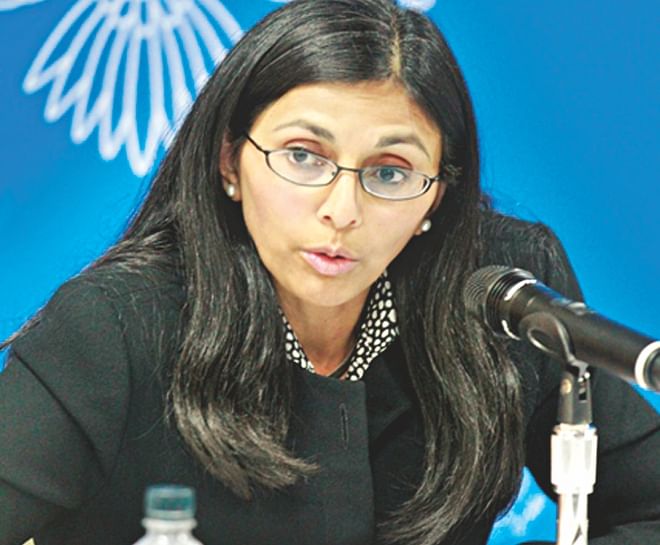US for greater political inclusion
US for greater political inclusion

US Assistant Secretary of State for South and Central Asian Affairs Nisha Desai Biswal has said Washington continues to press for greater political inclusion in Bangladesh, without which, a more stable and prosperous future will be at risk.
Biswal made the comment while delivering a lecture, “US Foreign Policy in South Asia: A Vision for Prosperity and Security”, at the Kennedy School of Government of Harvard University on Wednesday.
She said successful elections in Pakistan, Afghanistan and India -- all in the span of a year -- had created real opportunities for regional stability. “But we can't ignore the security challenges posed by the drawdown of Nato forces and the transition in Afghanistan,” she added.
She, however, did not mention anything about the recently held elections in Bangladesh. But in her testimony before the US Senate Committee on Foreign Relations on February 11, she had termed the January 5 parliamentary polls “a deeply flawed election” that did not credibly express the will of the Bangladeshi people.
Biswal said Pakistan conducted its first civilian transition of power last year, while Afghanistan was in the middle of successful and broadly participatory elections.
Nepal had also made huge strides, building democratic institutions after years of conflict, she said, adding that last November's elections saw a historic turnout of more than 70 percent.
She said one must acknowledge the important gains Bangladesh had made in improving health, food security and economic opportunity for its citizens.
Biswal added, “Bangladesh is the only country where we're implementing all three of President Obama's development initiatives on health, food security, and climate change and with US assistance, Bangladesh is one of the few countries on track to achieve its Millennium Development Goals [MDGs] related to child and maternal mortality.”
Speaking about political transition in the region over several years, she said Bangladesh in particular stands to develop tremendous commercial ties with the rest of Asia and had begun to break down trade barriers with India.
On the collapse of the Rana Plaza building and Tazreen factory fire that focused world attention on inadequate labour safety measures, Biswal said Washington along with European partners had engaged in an intense effort with labour, industry, civil society and the government to have great improvements in the garment sector in Bangladesh.
On security cooperation, she said the US security cooperation with both Bangladesh and Nepal had grown over the years, not only on international peacekeeping front, but also on border security, counterterrorism and High Availability Disaster Recovery.
“We are particularly focused in supporting Nepal and Bangladesh as they build capacity to respond to natural and humanitarian disasters,” Biswal said, adding that in Bangladesh they had built more than 500 cyclone shelters since 2001.